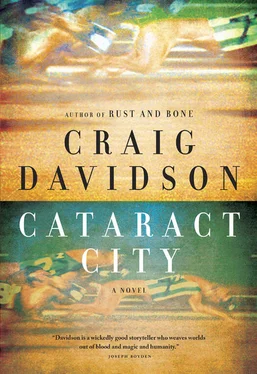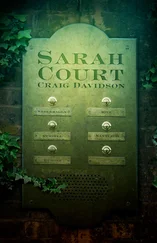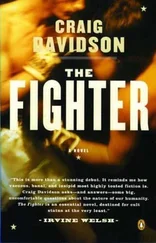“It’s fried,” he said, and spat in the dirt.
Tracks of crushed grass ran out behind the van’s tires. I didn’t know how long we’d driven off the road, but it hadn’t seemed all that far last night.
“Can we follow them out?” I said.
“Or wait here for someone to find us.”
“Do you think anyone’s looking?” My eyes drifted to the tent. Mahoney was laid out on his frayed sleeping bag, eyes open, dentures poking past his ashy lips. I was terrified he’d sit up. “Let’s go, Dunk.”
We found an old backpack in the van. Also a few cans of Coke, half a bag of barbecue chips, a Three Musketeers bar, some rags and a bottle of vitamin caplets big enough to choke an elephant. Glossy magazines with pictures of muscled-up men; other magazines of naked ladies — Dunk put one of those in the pack. We left the pills and empty beer bottles.
Dunk found a box of bullets in the glovebox and fiddled with the pistol. I was afraid it’d go off accidentally, leaving a smoking ring in his forehead. The cylinder fell open. Dunk picked out the spent cartridges, slotted in fresh ones and thumbed the safety. He put it in the backpack and gave the Buck knife to me.
What about the tent? We could burn it, or leave it open for the animals to find Bruiser. He had dragged us out here, got drunk, gone mad and died. What did we owe him?
“We could … roll him up in the tent? Put some stones on to hold it down.”
Dunk sawed his arm across his nose. “He’s just worm food now, anyway.”
The stones were still warm from the fire. We rolled the biggest ones to the tent. Dunk kicked the tent poles away. It collapsed with an outrush of foul air as the canvas sagged over Mahoney’s body. I could make out his face where the material lay across the hawklike bridge of his nose.
We heaped stones on the tent’s edges. Dunk lifted the biggest one, cradled it to his gut, and dropped it. Mahoney’s body bent at the waist — heels raising up, nose straining against the canvas — then lay flat.
Dunk shrugged the pack onto his shoulders and we followed the tire tracks out of the clearing.
The woods were alive with movement. Here a spooked rush of limbs. There a flurry of wings. All of it was timid. Funny to think that, in daylight, a pair of kids could be lords of the forest.
The only creatures who didn’t fear us were the insects. Mosquitoes helicoptered around my ears, giving off a maddening whine. One drew so close that I was sure it would fly straight into the canal and then into my brain to suck the blood out of the grey matter. When it landed on the hard little hump above my eardrum I pinched it between my fingers; the bastard crumpled with a satisfying feel, like softest metal. The satisfaction was short-lived, as the bugs had found us by then: they were everywhere, crawling and whining and buzzing, drinking our blood and sipping our sweat. Soon my arms were covered in angry whitened bites.
The day was cool beneath the leaves. Shafts of sunlight sparkled, dizzyingly bright, moving in squiggly patterns on the ground as the wind stirred the trees. Gnats meshed above puddles of water, coiling up in bug tornadoes. The heat evaporated the morning’s dew and gave the air a sweet green smell.
Dunk moved confidently, head down, thumbs hooked under the backpack straps. The scabs on his elbows shone like obsidian. Our breath came lightly as our feet flashed over the earth. We seemed to be making decent time, though our finish line was unknown.
We came to a break in the trees. A falcon circled in the sky, the white tips of its wings standing out sharply against the edgeless blue.
“I’ve never seen anything like that,” said Dunk. A squashed gnat was stuck to his front tooth. It looked like a poppy seed.
A stream trickled across the path. Minnows like tiny silver arrows darted and settled in the glassy water, which ran around the rocks in eddies.
Dunk scooped his hand along the stream’s edge and came up with a mudpuppy, an eel-like creature with stunted appendages like mouse paws. It thrashed in Dunk’s palm, whipping back and forth in spine-snapping spasms. Dunk returned it to the water; we watched it squirm under a flat, sandy rock, turn and peer up at us from its muddy bunker.
The slime-covered rocks above the water’s surface reminded me of Chia Pets. Dirty collars of foam surrounded most of them, and the water smelled funky: a waft of sulphur from a struck match.
“Be careful,” Dunk said. “I don’t want to carry you if you twist an ankle.”
“You think I want to carry you? ”
Dunk hopscotched across the rocks easily. I followed him but slipped on the last rock and got a huge soaker. “Fuckballs!”
Dunk hooted. My socks squelched, mud squeezing out of the eyelets. I flicked water at him off the toe of my sneaker.
“Hey, watch it!” Dunk skipped aside, still laughing.
It pissed me off. Dunk always beat me. In our two-man contest I always took the booby prize.
An expanse of sun-baked clay unfurled past the stream. The van’s tires had left no impression in it. We walked to a spot where the clay gave way to a drywash. There was nothing but polished stones and nappy scrub that would have sprung right up after the van had gone over it, leaving no clue.
Dunk wiped the sweat off his forehead with the hem of his T-shirt. His hip bones stood out above his belt, as pronounced as ears. My wet shoe baked in the sun, its rotten-algae smell infiltrating my nose. I stood on my tiptoes, straining for sounds of civilization, the silky shrriiip of car tires on the road. Something . But there was nothing except nature, dominated by the throaty gurgle of the stream. For the first time in my life I found this to be a scary sound.
Dunk said, “Which way?”
I slapped a mosquito. It left a spiky blot of blood on my wrist above the big blue vein. I pointed. “That way looks flatter.”
Dunk said, “Okay … but what did our Scout leader say about following a stream?”
I rubbed my temples, massaging the skin the way Mom did for Dad when he came home after a frazzling day. It stimulates the thinking muscle , she’d say.
“He said a small stream leads to a bigger stream, which leads to a river which leads to a lake which leads to a road,” I said.
The streambed carried on for a few hundred yards before hooking around a clump of green bushes. A rime of earth ran along the stream’s edge, making the side sun-cracked but passable.
Duncan said: “Let’s follow it.” He took a rag out of the backpack and tied it to a tree branch. “If we need to come back and go the other way, we’ll know this was where we were … or if we come past this again, we’ll know we’re not very good at orienteering.”
The stream meandered through the woods, a path of least resistance, splitting around molehills to leave small grass-topped islands. Water boatmen paddled in still pools, their bloated bodies moving in clumsy circles. Water skimmers zipped here and there. I’d once asked my father why they didn’t sink and he’d told me they were so light that they could dance along the water without falling into it. “There’s a skin on the water, like the skin that forms on top of pudding,” he’d told me. “A water skimmer’s body is lighter than water, believe it or not, so they can walk on the water just like you or I walk on a floor.”
The temperature rose. Trickles of sweat cut down my face; wet patches formed under my arms. A dark T appeared on the back of Dunk’s T-shirt. The sun dipped behind a bank of grey clouds but it didn’t get any cooler — if anything it was hotter , as if the sun, beating down on those rain-packed clouds, threw a blanket of broiling air over us.
Dunk held a steady pace, hitching his pack up on his back, hopping instinctively over spots where the shore threatened to crumble into foot-soaking pockets of mud — pockets that I would’ve stepped in had he not been guiding. The stream grew steadily narrower. We followed it down a long slope through a glade of low-hanging willows whose branches dipped right into the water; it was like walking through a series of doorways strung with beaded curtains.
Читать дальше












